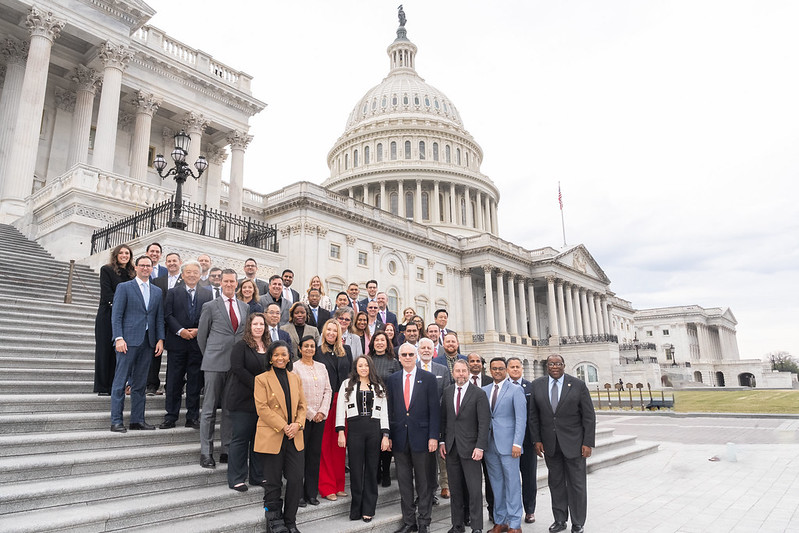2025 Washington, D.C. Fly-In: Advancing Houston’s Priorities on Capitol Hill
Published Mar 05, 2025 by Julia McGowen
The Greater Houston Partnership’s 2025 D.C. Fly-In brought together an 80-member delegation of Houston’s business and civic leaders to advocate for policies that will strengthen our region and keep Houston competitive on the national stage. Over the course of three days in Washington, the delegation met with key lawmakers, federal agencies, and industry leaders, driving home the importance of policies that support energy, infrastructure, workforce development, and economic growth.
Below is an overview of some of the key conversations heard during the D.C. Fly-In:
- Congressman Sam Graves, Chairman of the House Transportation and Infrastructure Committee, discussed key issues such as Surface Transportation Reauthorization and Pipeline Reauthorization, underscoring the importance of federal investments in Houston’s infrastructure, and the continued work to ensure safe and efficient transportation routes.
- Congresswoman Sylvia Garcia shared insights on the impact of potential Medicaid cuts, the potential loss of critical research dollars at the Texas Medical Center, and the need to protect NASA. She also emphasized how policies like Deferred Action for Childhood Arrivals (DACA) and mass deportations could harm Houston’s workforce and economy, stressing the need for immigration reform.
- A representative from Congressman Wesley Hunt’s office focused on the critical need for oil and gas policy reform and dredging the Port of Houston, both key priorities for maintaining Houston’s energy leadership and facilitating trade.
- Congressman Brian Babin highlighted the Keystone XL pipeline, calling it an essential project for energy independence and job creation. He also stressed the importance of accelerating permitting processes to ensure Houston remains at the forefront of innovation and energy policy.
- Congressman Randy Weber called for energy independence and immigration reform, focusing on the need to remove harmful regulations that impede energy development and secure the border. He also called for permitting reform to expand electricity grid capacity.
- Congressman Dan Crenshaw discussed the budget reconciliation process, emphasizing the need for fiscal discipline, and highlighted energy challenges – including Class 6 wells – and border security.
- Congressman Blake Moore from Utah emphasized the importance of domestic manufacturing, tax policy, and supporting policies like R&D expensing, underscoring how these issues are critical to maintaining a competitive economy for Houston and the nation.
- Wesley Coleman, Director of Programs for the Southwestern Division of the U.S. Army Corps of Engineers, spoke on the importance of flood mitigation and infrastructure projects in Houston. His remarks reinforced the need for continued collaboration between the Corps and local stakeholders to protect vulnerable communities and strengthen the region’s infrastructure.
- Congressman Jimmy Gomez from California discussed smart trade policy and the importance of keeping investment flowing to support economic growth. He also touched on housing affordability, recognizing that addressing homelessness in the region is crucial to fostering sustainable development.
- Congressman Pete Sessions brought attention to groundwater resources in Texas and the importance of water policy. He also highlighted government inefficiency and the need for fiscal responsibility, advocating for a reduction in government size to help manage the national debt.
- U.S. Senator John Cornyn spoke about the national debt and its impact on national security, noting that we are now spending more on interest on the debt than on defense. He also discussed tariffs and the need to protect the Coastal Spine to safeguard the Port of Houston.
- Congressman Michael Cloud addressed energy and fiscal issues, emphasizing the need for comprehensive solutions to meet energy demands. He also voiced strong support for the U.S. Army Corps of Engineers and discussed the impact of the Inflation Reduction Act on Houston’s economic future.
- U.S. Senator John Curtis of Utah focused on permitting reform and the need for a more predictable and efficient permitting process for energy and infrastructure projects. He also reinforced the importance of energy affordability and reliability, noting that fossil fuels have lifted millions of people out of poverty and remain essential to the global economy.
- Tommy Joyce, Assistant Secretary for the Office of International Affairs for the Department of Energy, underscored the link between energy security and national security, advocating for policies that empower companies to innovate and lead in energy development.
Beyond the policy discussions, attendees had the opportunity to tour the Bureau of Engraving and Printing, getting an exclusive look at the production of U.S. currency – a fitting reminder of the economic foundation on which Houston’s future growth will be built.
These advocacy efforts are guided by the Partnership’s federal priorities, including advancing Houston’s role as the Energy Capital of the World through energy transition efforts, securing flood and storm surge protection with the Coastal Texas Program, and advocating for policies that bolster workforce development and economic development. These priorities are crucial in ensuring Houston remains a leader in both traditional and emerging industries.
This year’s D.C. Fly-In reaffirmed the power of collaboration and engagement with federal stakeholders. As we continue to advocate for the policies that matter most to Houston’s future, we remain committed to working alongside our federal partners to foster a stronger, more resilient region for all.
 The Houston Report
The Houston Report




















